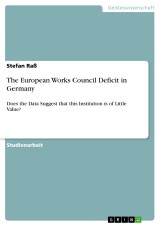Details

The European Works Council Deficit in Germany
Does the Data Suggest that this Institution is of Little Value?1. Auflage
|
13,99 € |
|
| Verlag: | Grin Verlag |
| Format: | |
| Veröffentl.: | 12.05.2016 |
| ISBN/EAN: | 9783668216501 |
| Sprache: | deutsch |
| Anzahl Seiten: | 14 |
Dieses eBook erhalten Sie ohne Kopierschutz.
Beschreibungen
Studienarbeit aus dem Jahr 2016 im Fachbereich Soziologie - Arbeit, Beruf, Ausbildung, Organisation, Note: 1,3, Friedrich-Alexander-Universität Erlangen-Nürnberg (Institut für Soziologie), Veranstaltung: From a National to a Transnational System - Industrial Relations in Motion, Sprache: Deutsch, Abstract: Globalization is the driving force which propels human kind into an ever faster, more complex and interwoven economic system. In 1994 the European Works Councils Directive (EWCD) was passed by the Council of the European Union and 2016 marks the 20 years anniversary since the Directive came into force in 1996. The adoption of the Directive was marked by widespread debate and critics argued that the EWCD was a flawed means to generate transnational employee participation, while proponents saw great potential for an institution that fosters social dialog. The legislation was also controversial among policy makers. The European Commission envisioned a significant step forward for the development of the social dimension of industrial relations in Europe, while employer organizations opposed the EWCD and lobbied conscientiously to reduce the coverage of the Directive.
For the last 20 years there has been controversy around the effectiveness of the policy and the modest adoption of the Directive. This paper seeks to spread light on whether there is enough value in European Works Councils for the institution to prosper. Therefore the underlying issues concerning the low number of European employee representation are explored. Surprisingly, Germany is one of the countries with the lowest EWC coverage rate among its European partners.
Consequently, Europe’s biggest economy can serve as reverence point for problems with European Works Councils and is of special interest investigating the institution. This analysis shall serve as a steppingstone in order to figure out whether European Works Councils are of little value for workers, or whether the institution is still in the process of reaching its full potential.
For the last 20 years there has been controversy around the effectiveness of the policy and the modest adoption of the Directive. This paper seeks to spread light on whether there is enough value in European Works Councils for the institution to prosper. Therefore the underlying issues concerning the low number of European employee representation are explored. Surprisingly, Germany is one of the countries with the lowest EWC coverage rate among its European partners.
Consequently, Europe’s biggest economy can serve as reverence point for problems with European Works Councils and is of special interest investigating the institution. This analysis shall serve as a steppingstone in order to figure out whether European Works Councils are of little value for workers, or whether the institution is still in the process of reaching its full potential.
Diese Produkte könnten Sie auch interessieren:

Planungshilfe für technologieorientierte Unternehmensgründungen

von: Günter Hirth, Rainer Przywara

54,99 €















